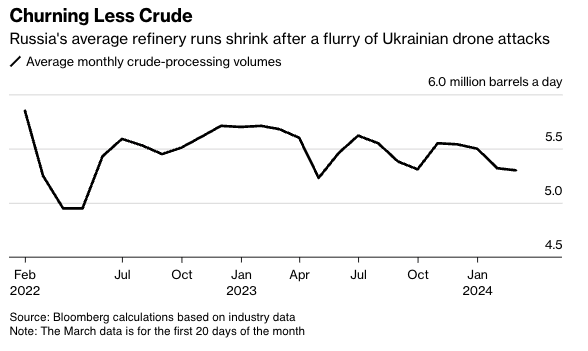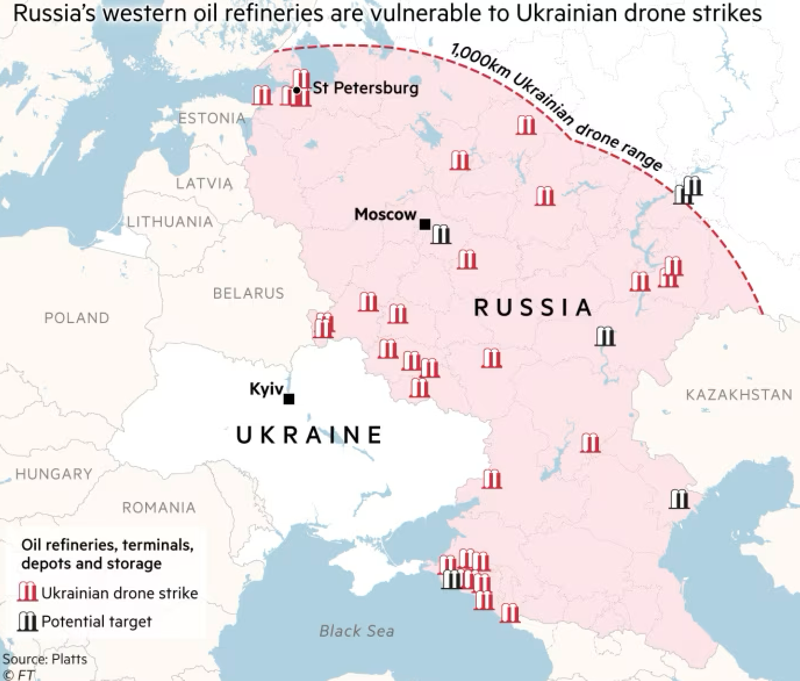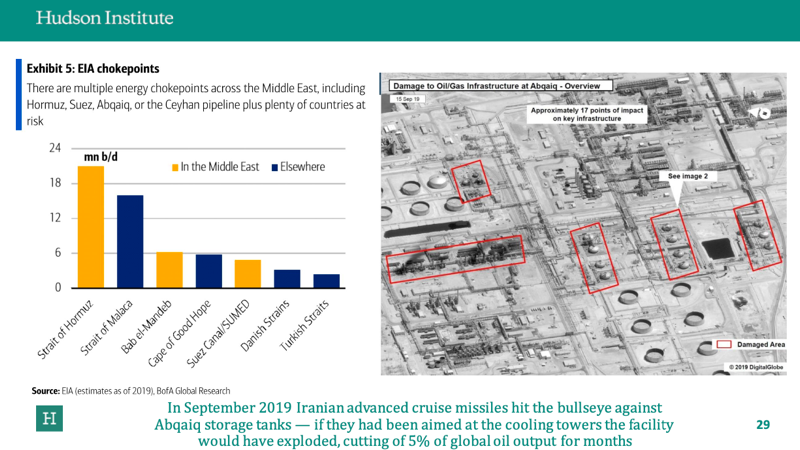Ukrainian drone strikes on Russian oil refineries continued in the overnight hours, with two separate attacks. The latest wave of drone attacks on the Russian refinery system has forced the swing producer's daily average oil refining rate to drop to a ten-month low.
Bloomberg reports a suicide drone caused a fire at the Kuibyshev refinery in Russia's Samara region. The fire was extinguished at the refinery, which has an annual capacity of 7 million tons of oil. There was no word on damage or how much output was affected.
The Russian Kuibyshev Oil Refinery in Samara continued to burn into this morning, several hours after a successful overnight Ukrainian drone attack.
— OSINTtechnical (@Osinttechnical) March 23, 2024
The fire was reportedly only controlled by 10 AM local. pic.twitter.com/JZN89XtFhk
Meanwhile, Rosneft Kuibyshev refinery in Samara has been hit. Hey, Financial Times, are you keeping up with refineries bingo card? pic.twitter.com/qzKHJQa8eJ
— Maria Avdeeva (@maria_avdv) March 23, 2024
A second drone attack was reported at the nearby Novokuibyshevsk refinery. However, local governor Dmitry Azarov said defense personnel repelled the drone without causing any damage.
"There were drone attacks on oil refineries in the region. At the Kuibyshev refinery, there was a fire at the primary oil refining column," Azarov said, as quoted by Interfax news service.
The latest attacks come as new data sourced from Bloomberg shows Russia's average daily oil refining rate was around 5.03 million barrels between March 14 and 20, down more than 400,000 barrels a day from the average for the first 13 days of the month—or a ten-month low.
 |
| Source: Bloomberg |
A new phase of the war is underway as Ukraine's replacement for artillery is cheap suicide drones targeting the Russian oil export machine deep within the country.
So far, drones have targeted 13 major refineries and two smaller plants, reducing processing capacity by about 480,000 and 900,000 barrels a day.
 |
| Source: Financial Times |
According to a person familiar with the data, Rosneft PJSC accounted for half of Russia's lost processing capacity in the last week after drones damaged two major facilities.
Russia's reduced refining rates indicate that authorities will focus on boosting domestic supplies, resulting in lower crude product exports worldwide.
"The latest attacks targeted primary refining processing units resulting in Russian waterborne product exports decreasing by an average 1 million b/d over the last two weeks," Wood Mackenzie Emma Howsham wrote in a note.
Howsham noted the disruption so far is "still unlikely to move the needle or impact sentiment around the softening global diesel/gasoil market."
Meanwhile, Washington officials warned senior officials at Ukraine's state security service and military intelligence directorate that repeated drone attacks on Russia's energy infrastructure could drive up global oil prices.
Of course, the Biden administration would be concerned about these attacks because the last thing the White House needs is soaring energy prices reigniting consumer and/or producer prices. Also, higher crude prices would complicate the Federal Reserve's planned pivot.
In the Middle East, there are increasing fears that Iran could be on the cusp of weaponizing crude as Houthis could launch a drone and missile attack on processing facilities at Abqaiq and Khurais in eastern Saudi Arabia (read: "The Weaponization Of Crude Could Trigger The Next Financial Shock").
Successful attacks on these refineries would be enough to push Brent into triple-digit territory.
